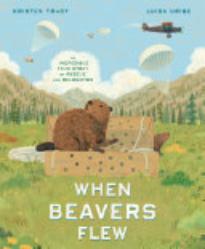Review of When Beavers Flew: An Incredible True Story of Rescue and Relocation
 When Beavers Flew: An Incredible True Story of Rescue and Relocation
When Beavers Flew: An Incredible True Story of Rescue and Relocation
by Kristen Tracy; illus. by Luisa Uribe
Primary Random House Studio/Random 40 pp.
7/24 9780593647523 $18.99
Library ed. 9780593647530 $21.99
e-book ed. 9780593647547 $11.99
The environmental contributions of beaver dams are well documented. But too many beavers can cause problems, particularly for humans attempting to alter the landscape for their own purposes. Such was the situation in McCall, Idaho, in 1948 when Fish and Game warden Elmo Heter sought a nonlethal way to remove the excess beaver population. Transporting the animals across mountainous terrain to the nearby preserve of Chamberlain Basin, where they had been hunted to near extinction a hundred years previously, proves impossible. But when Heter discovers a stash of parachutes left over from World War II, he wonders if he can devise a beaver airlift. He cleverly constructs boxes that can hold the creatures, be dropped from planes, and open automatically when they land. This translocation was a near-total success; only one out of seventy-six did not make it, and the rest thrived in their new location and restored the balance of the area’s ecosystem. Using an earth-toned palette, Uribe’s computer-generated, retro-style illustrations superbly reflect both the physical setting and the historical times. Faux artifacts such as notebook pages, hand-tied flies, and even a cliffside depiction of Native artwork decorate some pages. An author’s note goes deeper into the events (including problems with translocation) and provides information about humans and animals coexisting peacefully. A bibliography of selected sources completes the book.
From the ">September/October 2024 issue of The Horn Book Magazine.
RELATED
ALREADY A SUBSCRIBER? LOG IN
We are currently offering this content for free. Sign up now to activate your personal profile, where you can save articles for future viewing.







Add Comment :-
Be the first reader to comment.
Comment Policy:
Comment should not be empty !!!